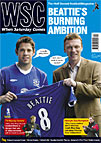 Sepp Blatter can try all he like, according to Ben Lyttleton, the FIFA World Player of the Year award is still a farce
Sepp Blatter can try all he like, according to Ben Lyttleton, the FIFA World Player of the Year award is still a farce
Ronaldinho’s success in becoming FIFA’s World Player of the Year was sealed the day before the announcement, when FIFA president Sepp Blatter said Thierry Henry deserved to win the award. Blatter was pre-empting claims that he and his cronies work behind the scenes to give the prize to his chosen player. It’s a clever wheeze: Blatter publicly backs Henry and then – shock horror! – that rascal Ronaldinho pips him to the crown. Sepp then spends the rest of the night trying to look surprised.
FIFA survived for 86 years without it, but decided that the pizzazz of a gong ceremony would be the ideal end-of-year platform from which to remind the world who runs the game. Which is why we were treated to the sight of Blatter jigging to a Eurotrash soundtrack as silver-and-gold ticker-tape flew out of a giant football and, more memorably, João Havelange making no effort to hide an enormous yawn as he looked longingly at his watch. Oh, and the longer the name – this year it was the FIFA Centennial World Player Gala 2004 – the better.
In its 14th edition, Ronaldinho became the fourth Barcelona-based Brazil star (after Romário, Ronaldo and Rivaldo) to win the award and to continue the dominance of players in Italy and Spain. Despite teams from seven different countries winning the Champions League in that period, the top player has always played in Serie A or the Primera Liga.
Arsène Wenger claimed an anti-Arsenal conspiracy deprived Henry, runner-up the past two seasons, of this year’s prize, but the truth is a lot less complicated than that. Most of the voters are basing their opinions on highlights packages from Champions League, international and domestic football. Henry may equal Ronaldinho in his dominance of a domestic league, but the Brazilian has excelled in the other competitions.
Also, some of the votes do not even stretch beyond the summer tournaments: how many matches outside of Euro 2004 and Copa America were seen by Guam coach Sugao Kambe (who voted for Theo Zagorakis, Roberto Ayala and Wayne Rooney)?
What about Palestine coach Ghassan Balawi (Ayala, Milan Baros, Didier Drogba)? Did they even know about Henry’s hat-trick against Liverpool that helped Arsenal to the title last April? Had they seen Ronaldinho’s curling free-kick in the November friendly against Germany, or his Champions League winner against AC Milan?
The voting structure was changed this year: the FIFA football committee drew up a short-list of 30 names, which contained only Europe-based players – harshly omitting Argentina star Carlos Tevez and Brazil’s Robinho – and they allowed international captains a vote. But the new format was hardly a resounding success: South Korea’s captain voted Ryan Giggs, Singapore went for Henrik Larsson and Vietnam for Robert Pires. FIFA also let FIFPro, the federation of professional footballers’ associations, cast 20 per cent of the ballot. For the record, from the 157 international coaches and 145 international captains who were polled, Ronaldinho won 89 first places to Henry’s 79, and 47 seconds to Henry’s 42.
This is not like the historically superior Ballon D’Or, the European Footballer of the Year award, which is presented by France Football magazine and dates back to 1956 (when Sir Stanley Matthews won). It is voted for by 52 journalists from every UEFA-affiliated country and lacks the “star factor” element of the FIFA award. It also makes for a more level playing field, with the past 14 winners coming from 12 different countries (compared to FIFA’s seven). AC Milan’s Ukraine striker Andriy Shevchenko won it this year.
Blatter has accepted the FIFA award needs improvement and has suggested that club coaches could have a vote next year. That would be a step to making the competition more prestigious, but how will he make Fabio Capello or José Mourinho’s vote worth more than Korea’s Jo Bonfrere (Raúl, Henry, David Beckham)? The simple fact is he needs to, otherwise the FIFA World Player of the Year award will have run its course.
From WSC 216 February 2005. What was happening this month